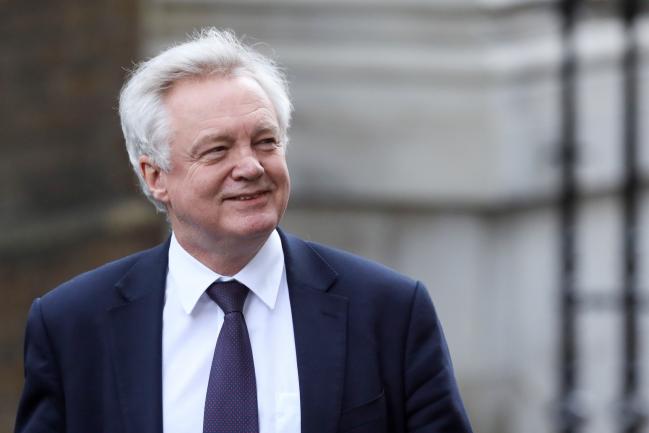(Bloomberg) -- U.K. Prime Minister Theresa May was thrown into a major crisis after two key members of her government quit in protest at her plans for a soft exit from the European Union.
Brexit Secretary David Davis and his deputy Steve Baker resigned on Sunday in a double-blow to May’s negotiating strategy and her grip on power.
“The general direction of policy will leave us in at best a weak negotiating position, and possibly an inescapable one,” Davis wrote in his resignation letter to May, which was released by her office. May’s plan to adopt EU regulations for all goods and agri-food after Brexit “hands control of large swathes of our economy to the EU and is certainly not returning control of our laws in any real sense,” he said.
The resignations of Davis and Baker came just two days after the premier secured the backing of her cabinet for a plan to keep close ties to the European Union after leaving the bloc. Davis and Baker, both longstanding euroskeptics, decided they could not support the policy, a person familiar with the matter said.
In her reply, May said she was “sorry” Davis had decided to quit. “I do not agree with your characterization of the policy we agreed at cabinet on Friday,” she said. “Parliament will decide whether or not to back the deal the Government negotiates, but that deal will undoubtedly mean the returning of powers from Brussels to the United Kingdom.”
As the minister responsible for the Brexit negotiations, Davis is a major voice in the debate in the U.K. The double resignation late on Sunday has the potential to derail May’s government and set in motion a chain of events that could lead to an attempt to oust her as prime minister. Their stand may embolden pro-Brexit lawmakers to make a move against her.The pound weakened slightly on the news of Davis’s departure.
Davis, Baker and other pro-Brexit members of May’s Conservative party have deep concerns about her plans for keeping the U.K. tied to EU rules for goods and adopting a close customs arrangement with the other 27 member countries.
They feel Britain should have a clean break from the bloc and be liberated to pursue new trade deals with other countries, as well as to make its own laws, free from European influence.
The resignations came at a critical and highly sensitive time for May’s strategy, as she seeks to make progress in negotiations with Brussels. A divorce agreement is due to be wrapped up in just 15 weeks, but there are still major obstacles to overcome.
On Friday, May achieved a rare consensus in a key cabinet meeting on the way forward for the negotiations with the EU. That agreement, at her Chequers country retreat, was meant to kick-start talks that have been stalled for months.
Second Thoughts
Davis and fellow Brexit backer Foreign Secretary Boris Johnson both agreed to support May’s proposal for a softer divorce than she had originally planned, and it seemed she had survived the storm. Johnson’s allies said on Saturday he decided not to quit as he wanted to remain in government to fight for the kind of Brexit he campaigned for.
May will have a key meeting with members of her Tory party to discuss her plan in Parliament on Monday. Some lawmakers have already expressed their misgivings.
(Adds resignation letter from third paragraph.)
